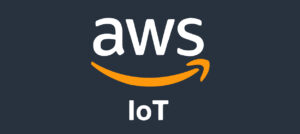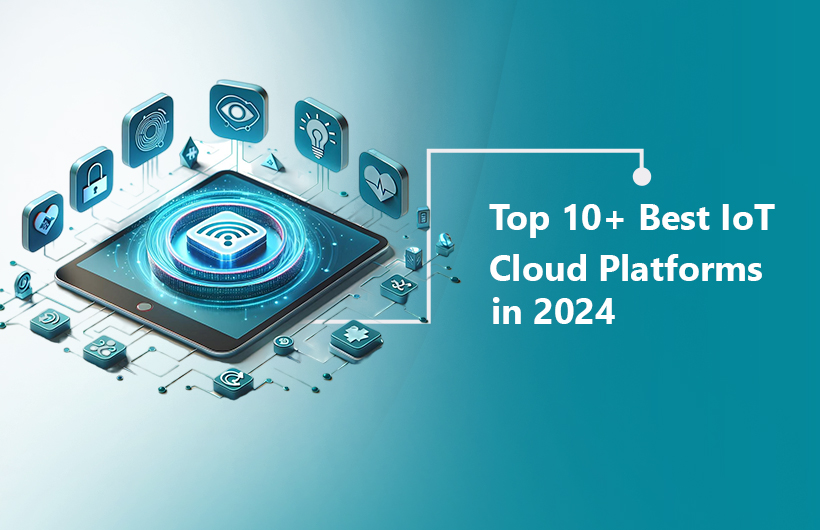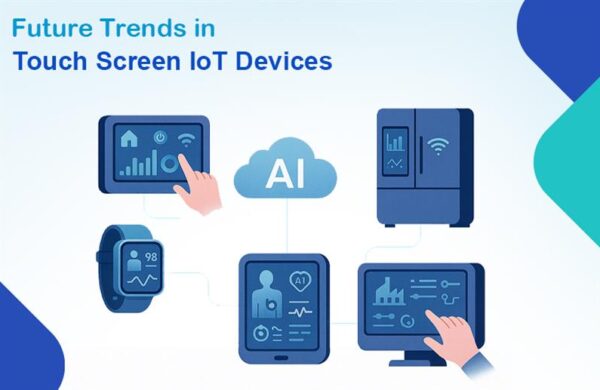The Internet of Things (IoT) is transforming the way we interact with the world, connecting everyday devices to the internet and enabling them to collect and exchange data. As IoT continues to evolve, choosing the right IoT platform becomes crucial for businesses looking to leverage this technology. The world of IoT cloud platforms is more competitive and advanced than ever before. This blog will explore the top IoT cloud platforms that are leading the way, offering comprehensive solutions for various IoT needs.
1. Amazon Web Services (AWS) IoT Core

AWS IoT Core is rated as one of the best and most famous Internet of Things platforms. It offers a secure and open architecture for the devices to communicate with cloud apps and other devices with no limitations to the number of connected devices. AWS IoT Core is designed for the Internet of Things (IoT) that supports billions of devices and trillions of messages. It is combined with other services offered by AWS, for instance, machine learning, analytics, and storage, making it a complete solution to IoT cloud requirements.
2. Microsoft Azure IoT Hub

Microsoft Azure IoT Hub is a flexible and low latency IoT solution for connecting, monitoring, and managing billions of Assets. Dismissing the device management, bi-directional communication, and stringent security features, it is widely popular among enterprises. Azure IoT Hub is compatible with other Azure services and allows constructing IoT solutions incorporating analytics and AI. Due to its geographical coverage and numerous partners, it can be considered one of the IoT cloud platform leaders.
3. Google Cloud IoT Core

Google Cloud IoT Core is a completely controlled service that provides a way to manage and connect millions of IoT devices located in different parts of the world and ingest their data. Google possesses good data analysis and machine learning features, which can help corporations acquire insights from IoT data and improve their processes. Since it is compatible with other Google Cloud services, it is one of the most suitable platform choices for constructing elaborate IoT solutions focused on data-driven companies.
4. IBM Watson IoT Platform

IBM Watson IoT Platform is rather famous for its analytics transforming power, along with its focus on IoT. It allows organising and secure connection of the business devices while offering a wide range of tools for data processing and displaying. One thing that makes IBM Watson special from other IoT cloud providers is its incorporation with cognitive computing and AI services. This makes it appropriate for industries that demand more analytical insights and predictive services. Security is well developed, and all important standards are taken into consideration in the platform; this is also a point in favour.
5. Siemens MindSphere

MindSphere by Siemens is the open IoT operating system that links up Products, Plants, Systems and Machinery. It is aimed at Industrial IoT applications as it provides a great number of features presented for analytics and AI for improving the productivity of the processes without interruptions. The latter is a part of the MindSphere platform and is characterised by an open architecture that enables its integration with other platforms and iot platform software, as well as the use of various applications created for this purpose in industrial IoT. The large and secure emphasis on the protection of data and information makes it a reliable platform for the industries globally.
6. Oracle IoT Cloud

Oracle IoT Cloud is meant to provide companies with the means of connecting, processing and incorporating IoT sources into organisational business networks. This allows the platform to work as a real-time analytics, predictive maintenance, and device management platform that can be applicable to the sectors including manufacturing, logistics, smart cities, and more. Thus, the Oracle IoT cloud platform can be considered fully equipped and based on Oracle’s reliable cloud, tightly interconnected with other Oracle applications.
7. Salesforce IoT Cloud

Salesforce IoT Cloud was developed to assist organisations in leveraging the value of IoT data in regard to customer and organisational performance. It enables companies to develop the automation of rules as well as IoT data and merge with customer relationship management systems. Thus, Salesforce’s heavy emphasis on customer-oriented IoT solutions is most suitable for companies seeking to optimise customer interaction and operational efficiency through IoT.
8. PTC ThingWorx

Thingworx of PTC is among the most recognised IoT platforms and includes solutions for the development of IoT applications. The components of the platform include RAD (rapid application development), connectivity versus integrations, analysis, and business AR (augmented reality). Hence, ThingWorx, including aspects of the industrial IoT and good compatibility with systems and equipment, is preferred by manufacturers and other industries. Due to its ease of use and clearly designed tools, the IoT market can be advanced by many businesses.
9. Samsung ARTIK Cloud

Samsung ARTIK Cloud offers IoT management, including device and ecosystem connections of various ARTIK-based systems. It provides strong device management, data storage, and analysis features to convey the platform. Due to the fact that Samsung ARTIK supports open API and has a developer perspective, this solution can be easily customised to fit the needs of any business creating IoT applications. The integration of this platform with other systems and protocols supports many IoT applications of different categories.
10. HPE Universal IoT Platform

For the efficient and manageable handling of IoT devices and their data, HPE Universal IoT Platform is the best available platform that is rich in features and flexible in terms of scalability. It is compatible with several connection interfaces and also offers good statistics and control functions. The solution positioning on interoperability and various assistance to IoT ecosystems are the key advantages of HPE for companies in different types of industries. The large-scale IoT solution capability and high security of the platform add even more value to the mix again.
Conclusion
Selecting the right IoT platform is critical because it determines the implementation of IoT strategic goals in organisations. The above-discussed platforms can fulfil various wants and needs of IoT applications and can be adopted in various industries. Thus, there is always an IoT Cloud Platform that aligns with your priorities of Analytics, Industrial IoT or Customer Focus.
When it comes to the IoT, Monarch Innovation is an expert in strategy and market positioning for enterprises. We have a group of specialists in our company who can guide you on the most suitable IoT platform and help in its adoption. If you plan to achieve operational excellence, improve or integrate customers’ experience or even foster innovation, Monarch Innovation stands ready to accompany you in the Internet of Things era.
FAQs
Q: Is IoT software or hardware?
A: IoT (Internet of Things) involves both software and hardware. The hardware includes the physical devices and sensors that collect and transmit data, while the software processes and manages the data, enabling connectivity and functionality.
Q: What is the role of the IoT platform?
A: An IoT (Internet of Things) platform serves as a centralised system that connects, manages, and analyses data from various IoT devices. It enables seamless communication between devices, provides tools for data processing and analysis, and helps in automating and optimising processes.
Q: What are the advantages of IoT?
A: The Internet of Things (IoT) offers numerous advantages across various sectors. Primarily, it enhances efficiency by enabling real-time data collection and analysis, which leads to smarter decision-making and streamlined operations. IoT devices can automate routine tasks, reducing human error and operational costs.
Q: Which is better, AI or IoT?
A: AI and IoT serve different purposes and often complement each other. AI excels at analysing data and making decisions, while IoT focuses on connecting devices and collecting data. The best choice depends on your needs: use AI for advanced analytics and decision-making, and IoT for networked data collection and device management.





